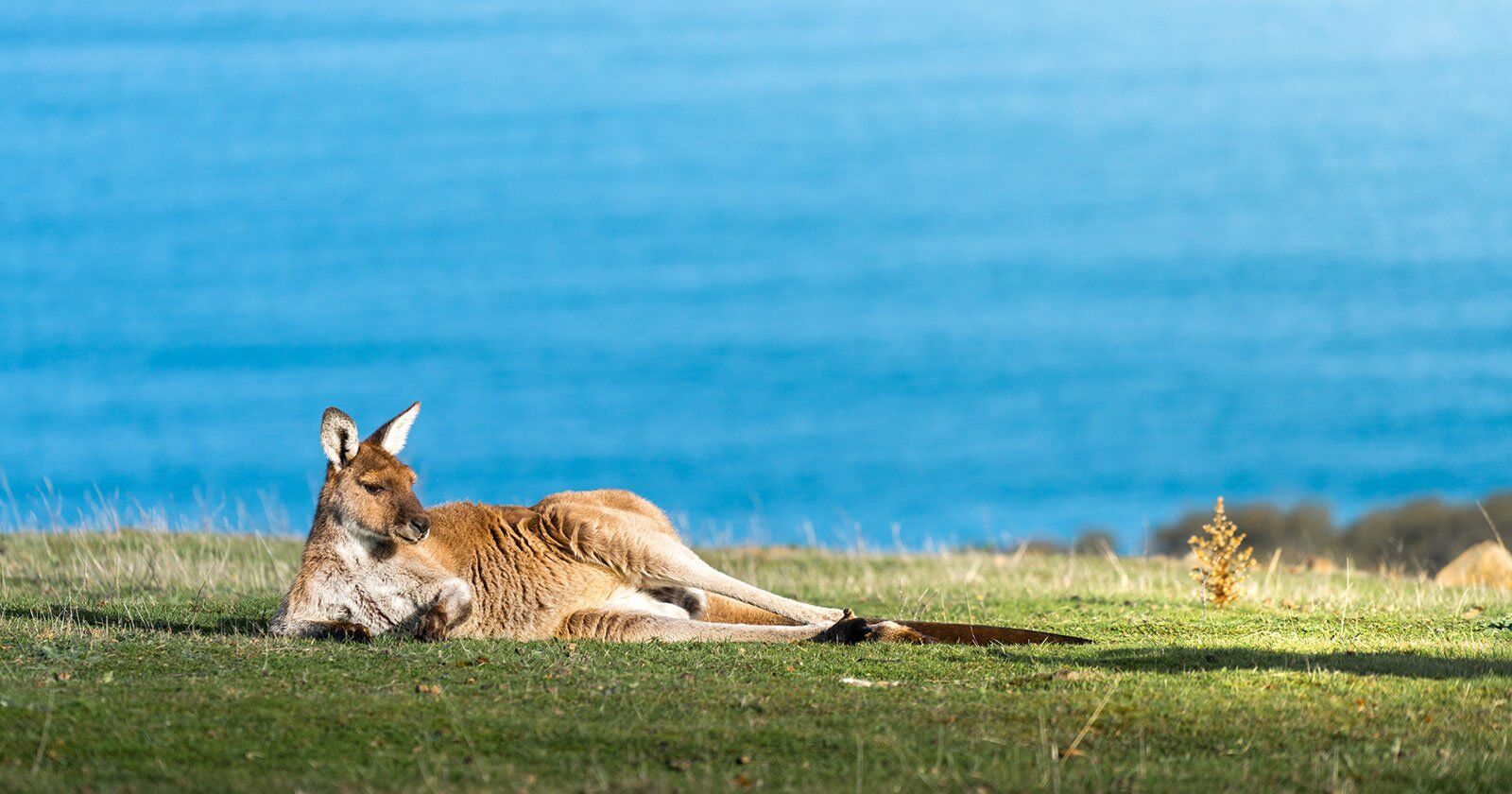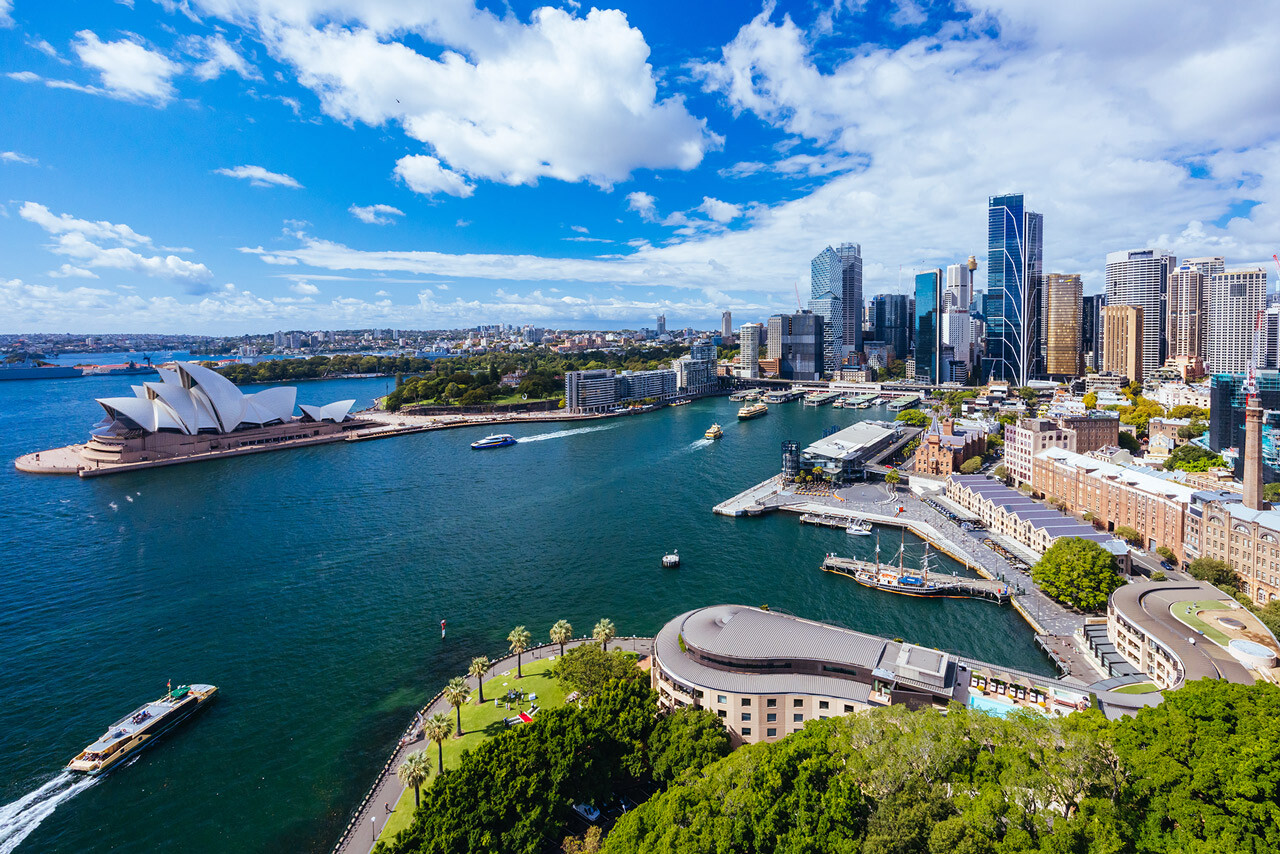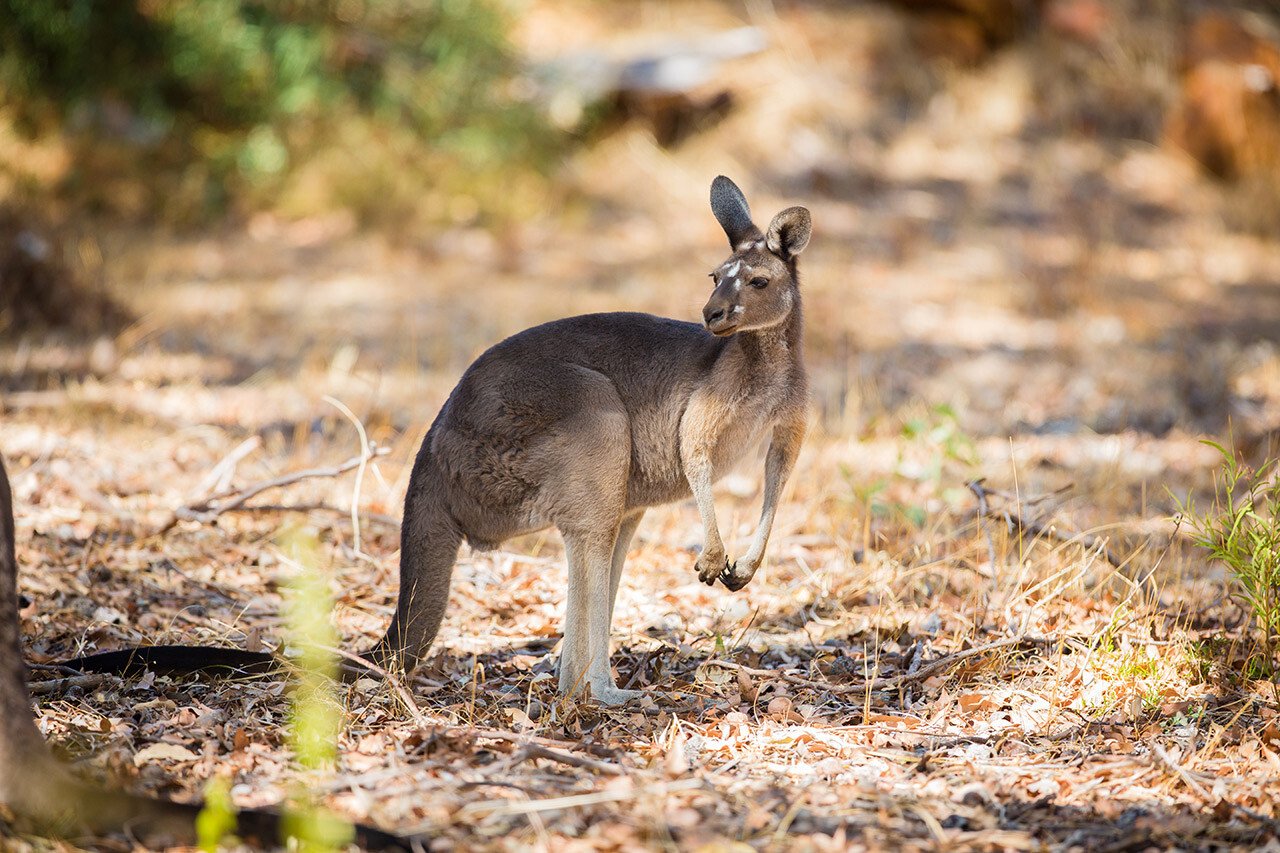The Best Places to Live in Australia
Thinking about moving to Australia? With its stunning beaches, laid-back lifestyle, and unique wildlife, it’s no wonder that many expats call Australia home. Choosing a place to live that best suits your lifestyle is key to making the most of life Down Under. Before diving into the best places to live, here’s one quick tip: the best time to relocate to Australia is between late autumn and early winter (April to July). Moving during these months means cooler temperatures for easier acclimatization and less crowding during the holiday season, making it simpler to settle in.
Let’s explore Australia’s top cities and regions for new residents, covering who they’re best suited for, the typical weather, and what each area has to offer for anyone moving from the U.S.
Sydney, New South Wales
- Best For: Tech & Finance professionals, beach lovers, and families
- Weather: Mild winters (50-60°F) and warm summers (70-80°F)
Highlights:
Sydney’s iconic beaches and balanced home and work lifestyle make it a top choice for expats. With major industries in finance, tech, and creative arts, Sydney offers career-driven opportunities. That, along with a laid-back coastal lifestyle, makes moving to Sydney ideal for families and professionals alike. Though the job market in Sydney can be competitive, so it’s best to go with a job already. On weekends, residents flock to Bondi and Coogee Beaches, and the city offers plenty of adventure with outdoor activities like the Bondi to Coogee coastal walk and nearby Blue Mountains hikes. Housing is pricier than in other cities, so it’s best suited to those with a solid income or corporate job.
For budget planning, Sydney’s cost of living is comparable to large U.S. cities like New York or San Francisco, especially for housing near the coast. However, the rewards of city life with breathtaking views and sunny beaches make it well worth it for many.
Melbourne, Victoria
- Best For: Artists, students, and coffee lovers
- Weather: Cool winters (40-50°F) and mild summers (70-80°F)
Highlights:
Melbourne, also considered Australia’s cultural capital, is packed with art galleries, music festivals, and a world-renowned café scene. Melbourne’s scene most appeals to young professionals, international students, and families. Neighborhoods like Fitzroy boast famous street art, while events like the Melbourne International Comedy Festival keep the city buzzing with activity year-round.
Melbourne is also home to high-ranking universities like the University of Melbourne and RMIT, making it ideal for students and young professionals. Its healthcare facilities are some of the best in Australia, offering peace of mind for families and individuals moving here. Melbourne’s four-seasons-in-a-day weather is unpredictable, but temperatures are pleasant year-round.
Brisbane, Queensland
- Best For: Warm weather lovers, families, and retirees
- Weather: Hot, humid summers (80-90°F) and mild winters (60-70°F)
Highlights:
Brisbane’s subtropical climate and riverside parks offer endless outdoor activities, from paddleboarding on the Brisbane River to exploring Moreton Island. Moving to Brisbane appeals to families and retirees who enjoy spending time outdoors, being active, and year-round sunshine.
The city also maintains a small-town vibe, making it easier for new residents to build a local network and integrate into the community. Housing is more affordable than in Sydney or Melbourne, a plus for families seeking more space. Brisbane’s warm climate may be intense for some, but sunny skies and relaxed living make it an attractive option for tropical weather lovers.
Perth, Western Australia
- Best For: Nature enthusiasts, beachgoers, and people seeking a relaxed lifestyle
- Weather: Warm, dry summers (80-90°F) and mild winters (50-60°F)
Highlights:
Isolated yet beautiful, Perth is a hidden gem for people who love the outdoors and want a slower pace of life. Surrounded by national parks, pristine beaches, and friendly locals, Perth is great for work-life balance and offers ample recreational options. Locals enjoy snorkeling at Rottnest Island and exploring the Pinnacles Desert, making it ideal for adventure seekers and ocean lovers.
Compared to Sydney and Melbourne, Perth’s cost of living is more affordable, especially for housing. This affordability, paired with a Mediterranean climate, appeals to beach enthusiasts and expats looking for a more relaxed setting.
Adelaide, South Australia
- Best For: Wine lovers, food lovers, and retirees
- Weather: Mild winters (40-50°F) and warm, dry summers (70-85°F)
Highlights:
Adelaide’s charm lies in its famous wine regions, food markets, and picturesque beaches. This mid-sized city is known for its slower pace and affordable living, making it popular with retirees and foodies alike. The nearby Barossa Valley and McLaren Vale wine regions offer world-class wines and make for fantastic day trips.
Adelaide’s Mediterranean climate is ideal for year-round comfort, while its friendly community atmosphere is perfect for those seeking a peaceful, balanced lifestyle. The healthcare and education facilities are excellent and affordable, making it especially appealing for retirees and families.
Hobart, Tasmania
- Best For: Nature lovers, retirees, and remote workers
- Weather: Cool winters (40-50°F) and mild summers (60-70°F)
Highlights:
Hobart, Tasmania’s capital, is ideal for those who want a cozy community vibe with access to nature. Surrounded by pristine wilderness, Hobart is a fantastic base for outdoor enthusiasts, with scenic destinations like Cradle Mountain and the Overland Track nearby. Lower housing costs and a cooler climate make it perfect for retirees and remote workers.
Hobart’s four distinct seasons feel familiar to Americans from northern states, with mild winters and cooler summers, making it easy to adjust. The natural beauty and relaxed pace appeal to those looking for a quieter lifestyle with endless outdoor adventure.
Gold Coast, Queensland
- Best For: Surfers, beach lovers, and young families
- Weather: Warm year-round with hot, humid summers (80-90°F) and mild winters (60-70°F)
Highlights:
The Gold Coast, known for it’s beaches, surf culture and social scene, attracts water sports enthusiasts and young families. It’s ideal for those who love a warm, beach-centered lifestyle with plenty of outdoor options.
While the Gold Coast has a thriving tourism industry, it also has a close-knit community feel, making it easy to settle in. Families will find affordable housing and a vibrant neighborhood culture with community events, markets, and coastal activities that make this area feel like a permanent vacation spot.
Canberra, Australian Capital Territory
- Best For: Public servants, families, and history buffs
- Weather: Cold winters (30-50°F) and warm summers (70-85°F)
Highlights:
Australia’s capital, Canberra, is quieter than other major cities but offers excellent job opportunities in government and academia. Families are drawn to its safe, family-friendly environment with top-tier schools and healthcare. Canberra is also rich in history and culture, with landmarks like the Australian War Memorial and Parliament House.
Canberra offers a unique blend of outdoor and intellectual pursuits. Its cooler winters with occasional frosts and warm, dry summers create a balanced climate, making Canberra an appealing, well-rounded place to settle.
Moving to Australia
Moving from the U.S. to Australia is an adventure, and choosing the right city for your vibe is your first step to making it feel like home. Whether you’re drawn to Sydney’s bustling harbor, Melbourne’s cultural flair, or Hobart’s scenic tranquility, Australia has a spot that suits every lifestyle.

Americans want to move to Australia for its high quality of life, stunning natural landscapes, and friendly, laid-back culture. Diverse and vibrant cities and beautiful outdoor environments ranging from pristine beaches to rugged bushlands offer a setting for adventure and tranquility. Moving to any country from the US will take you some time to adjust. We’ve made this list of the top 5 cultural differences for Americans to know before moving to Australia to give you a head start on adjusting to your new home.
1. Laid Back Lifestyle
The first thing you might notice, which may also be one of the reasons you were drawn to Australia in the first place, is the laid-back lifestyle. Australians generally have a more laid-back attitude than Americans, especially when it comes to work-life balance. The Australian approach is often more about enjoying life and less about working excessively. Be prepared for more emphasis on a work-life balance and a more relaxed atmosphere at work with less of a push for overtime. One of the things that keeps Australia at the top of work-life balance rankings is the 32.4 average hours worked per week. The maximum you can work before overtime in Australia is 38 hours per week.
2. Language and Slang
Though both Australia and the US speak English, we all have our own slang, and that can even change based on where you are in the country. Be aware that there will be expressions that you are not used to, and that may cause some confusion at first. Some will be easy to figure out in context, but not all. One slang term you will probably encounter pretty quickly is “Arvo”, meaning afternoon, not to be confused with “Avo” for avocado and brekky for breakfast. There are obviously many more, so it’s a good idea to research common Australian expressions and slang before you go. Here’s a list of 33 Australian slang phrases from CNN travel to get you started.
3. Sports
Sports are a major part of Australian culture, similar to the US. Unlike the U.S., where football, basketball, and baseball dominate, Australians are huge fans of cricket, Australian Rules Football (AFL), and rugby. Participation in local sports clubs is also more common. Engaging in popular Australian sports like cricket, AFL (Australian Football League), or surfing can be a great way to meet people and integrate into the community. Watching these sports can help you strike up conversations and understand local passions.
4. Coffee Culture
Australians take their coffee seriously, and the coffee culture is more like that in Europe than in the U.S. Expect to find a variety of cafes offering high-quality espresso drinks rather than drip coffee. Take the time to explore Australia’s rich coffee scene. Australians pride themselves on their coffee, and joining in on the coffee culture could end up being a pleasant part of your daily routine.
5. Tipping Practices
Tipping is not as common or expected in Australia as it is in the U.S. In Australia, workers tend to be paid a livable wage. The national minimum wage in Australia is $23.23. When eating out, many restaurants have a service charge. This service charge goes to the staff. Tips are considered a bonus for exceptional service rather than a necessity. But don’t be surprised if some refuse to take a tip. Many Australians do not want a tipping culture because it should be up to employers to make sure employees make a livable wage.
Connect with Other Expats and Locals in Australia
When moving to Australia, embrace the local culture. Do a little research about your new home and people before you go. Join some local groups or communities, whether online or in-person, that include both Expats and locals. Get out and participate in community events. Joining groups can provide support and valuable insights as you navigate your new surroundings.

Moving to a new country can be an exciting but stressful experience. If you’re moving from the US to Australia, many things must be considered to ensure a smooth transition. As an international moving company, we understand the challenges of moving abroad.
We recommend following these ten tips for a stress-free move from the US to Australia.
1. Research your destination
Before moving to Australia, learning about the culture, customs, and laws is essential. You’ll also need to determine what documents and visas are required for your move.
Australian Customs and Laws to be Aware of Before Your Move from the US.
For example, Australians drive on the left side of the road, so adjusting to this difference is important. Additionally, Australia has strict gun control laws, so make sure you understand the regulations before bringing any firearms into the country. It’s also important to note that Australia has a Goods and Services Tax (GST) of 10%, added to most goods and services. Being aware of these customs and laws can help make your transition to life in Australia smoother and more enjoyable.
2. Hire a professional moving company
Hiring a reputable moving company can help remove some of the stress of moving to Australia from the US. Work with a reputable company with experience with international household moving and can provide you with a detailed moving plan. At Schumacher Cargo, our international moving specialists are here for you. Call us to get started with your move.

3. Pack smart
Make a list of essential items to pack for your move and what to leave behind. Decluttering before the move can also help reduce stress and make the packing process more manageable. You can get started with our international moving checklist.
4. Plan your finances
Moving to Australia can be expensive, so it’s important to budget and plan accordingly. Consider the hidden costs of an international move, such as customs fees and taxes. Get a quote for the cost of moving your household items to Australia so that you know what to expect.
5. Prepare for customs
Going through customs can be a stressful experience, but being prepared can help ease the process. Make sure you have all the necessary documents and items declared. Your international moving specialist at Schumacher Cargo can help you with documentation and declaring items for your move.
For more information, you can also visit the Australian Customs and Biosecurity FAQ page.

6. Adjusting to a new culture
Adjusting to a new culture can be challenging but also an opportunity for growth. Stay open-minded and curious about your new environment, and seek opportunities to connect with locals.
7. Moving with pets
Moving with pets can be a stressful experience for both you and your furry companion. To ensure a safe and comfortable journey, book pet-friendly accommodations and provide plenty of exercise opportunities. Always double-check the pet policy before booking your accommodations, and bring all necessary paperwork and vaccinations.
8. Find essential services
Finding housing, schools, and healthcare in a new country can be overwhelming. Research your options before you arrive to ensure a smooth transition.
Healthcare in Australia
When moving from the US to Australia, US citizens need to be aware of the healthcare services available to them. In Australia, the healthcare system is publicly funded, meaning all citizens and permanent residents have access to free or subsidized medical treatment. This includes general practitioner visits, emergency care, and prescription medications. Private healthcare is also available for those who prefer it, with options for private hospitals, specialists, and additional dental and vision care services.
9. Stay connected
Moving to a new country doesn’t mean you have to lose touch with family and friends. Stay connected through video chats, social media, and other means of communication.
10. Take care of yourself
Moving can be a stressful experience, so it’s essential to take care of yourself during the process. Take breaks when needed, practice self-care, and seek support from friends and family.
Moving to Australia from the US can be a challenging but rewarding experience. With these tips, you can make the process as stress-free as possible. Remember to research your destination, hire a professional moving company, pack smart, and plan. At Schumacher Cargo, we can take some of the stress out of your move from the US to Australia. Call us now at 1-800-599-0190 to talk to one of our international moving specialists to get started.
There are many great reasons for living in Australia as an American. Ultimately, it offers a great experience to both expats looking for work and to retire. However, there are pros and cons of living in Australia vs USA to look at first. We’ll take a look at them and why we still think many Americans should try it out.
Check out our article on the pros and cons for differences living in the Australia below!

Living in Australia: Pros and Cons Disclaimer
To start off, it is important to understand there are differences in life throughout Australia. Areas are different even within the same country. Living in Sydney will be different than Melbourne, Brisbane, Perth, etc. For this reason, the differences for the Australia vs USA are broad and may not apply to all areas.
Pros of Living in Australia vs USA
There are many pros when living in the Australia vs the USA. The fact that so many Americans are living there right now should be a testament to that. We’ve listed some of the many benefits expats have told us they liked while staying here.
No Language Barrier
When living in Australia, many Americans find the fact that they speak English a great benefit. This means they can move here knowing they can speak the same language as everyone there. Be careful though, as the slang and terminology may be a bit different than what you use at home!
High Standard of Living
Australia is one of the countries with the highest standards of living and wages. They are know for one of the highest qualities of life and pay is significantly higher in the same industry. This translates to why there are many Americans, as they are here to accept new jobs.
Vast Natural Areas
Australia has biodiversity unlike anywhere on earth. There are rainforests, mountains, beaches, deserts, and many more. Each of these all have its own set of interesting creatures and animals native to Australia alone. With breathtaking views and climates available, many people enjoy going out to see nature more here.
Cons of Living in Australia vs USA
Though there are also cons when living in the Australia vs the USA. When living here, many Americans have experiences that are unappealing and detract from the overall experience. We’ve listed some of the many cons expats have told us they did not like while staying here.
Expats Still Pay US Taxes
Given that you are an American expat in Australia, you still have to pay US income tax if you make money. You can get rid of your US citizenship and become an Australian citizen, but that is pretty drastic. Most expats pay the taxes to both countries as they may want to return to the states in the future.
High Cost of Living
Since there is higher living quality and wages, the cost of living also goes up with them. One of the places this is the worst is in housing. Buying a home is very difficult and expensive, so you may be better off renting if you don’t plan on staying for a very long time.
Also if you aren’t covered by Australia’s national healthcare, you may end up paying a lot for health insurance as well. Though if you are covered, you’ll have some of the best health insurance for free.
Dangerous Weather and Animals
If you like really hot days and really cold nights or tons of snakes, then this isn’t a con. Otherwise, these are common throughout most of Australia. Even worse, some of the deadliest spiders lurk all around the country. Many expats say they get used to these over time, but it definitely needs some time to acclimate.
Want to Live in Australia?
With the pros and cons of living in Australia, there are definitely reasons to move here. Even though there are downsides, nowhere is perfect. Australia has had a boom in Americans living there for good reason anyways.
If you are moving or thinking about moving to Australia, we at Schumacher Cargo Logistics can help you out. With over 40 years of experience, SCL is the premier moving company to Australia. From cars to full households, we can ship your goods door to door from the US to anywhere in the country. There are definitely more differences living in Australia, but we’ll let you experience the rest while you’re there.
To get started fill out our Online Quote Form or read another of our Australia guides below.
More Australia Guides
Written by Damien Shields
With the world going ever more global, it’s becoming easier and easier for people to try out living in an exciting new part of the world. And one of the most exciting places you could hope to test out is Australia. But with so many iconic, exotic, and exciting things on your plate, what do you do and see first?
A big move requires planning and preparation, and luckily we’re just the right people to help with that during moving season. We can help your move to Australia be as easy and stress-free as possible.
7 Things To Do And See FIRST In Your Move to Australia:
Great Barrier Reef:
This one will certainly qualify as an adventure and might cost a bit but you absolutely have to see the biggest barrier reef in the entire world. Home to some of the most beautiful and fascinating creatures on Earth, the Great Barrier Reef is a sust see!
Drive the Great Ocean Road:
One of the cheaper and yet more stunning sights in Australia can be found simply by driving the Great Ocean Road. This coastal highway offers easily some of the best shoreline driving on the planet. Be sure to watch the coast for the 12 Apostles – 12 columns of limestone jutting out from the waters.
Sydney Opera House:
One of Australia’s most, if not the most, iconic buildings is the Sydney Opera House. You simply must attend something here. It would be like moving to Chicago and not seeing the Sears Tower (yes, that’s right Sears Tower).
The Grampians National Park:
This park in Victoria is home to some of the coolest rock formations in the country as well as some of the oldest Aboriginal rock art. This is the Monument Valley of Australia.
Byron Bay:
Though a bit of a tourist trap, Byron bay in Queensland is one of Australia”s most iconic beaches. You’ll be doing yourself a disservice by not checking it out once. Might as well get it out of the way while you are still a tourist before setting out to find the hidden gems.
Uluru:
The most iconic sight in all of Australia’s Outback is Uluru. This humpbacked rock is truly a marvel of geography and ancient culture. You must see it!
Kakadu National Park:
While pretty much any of Australia’s national parks should be on your immediate must see lists, Kakadu offers some of Australia’s rarest, most iconic, and most gorgeous sights all in one park.






